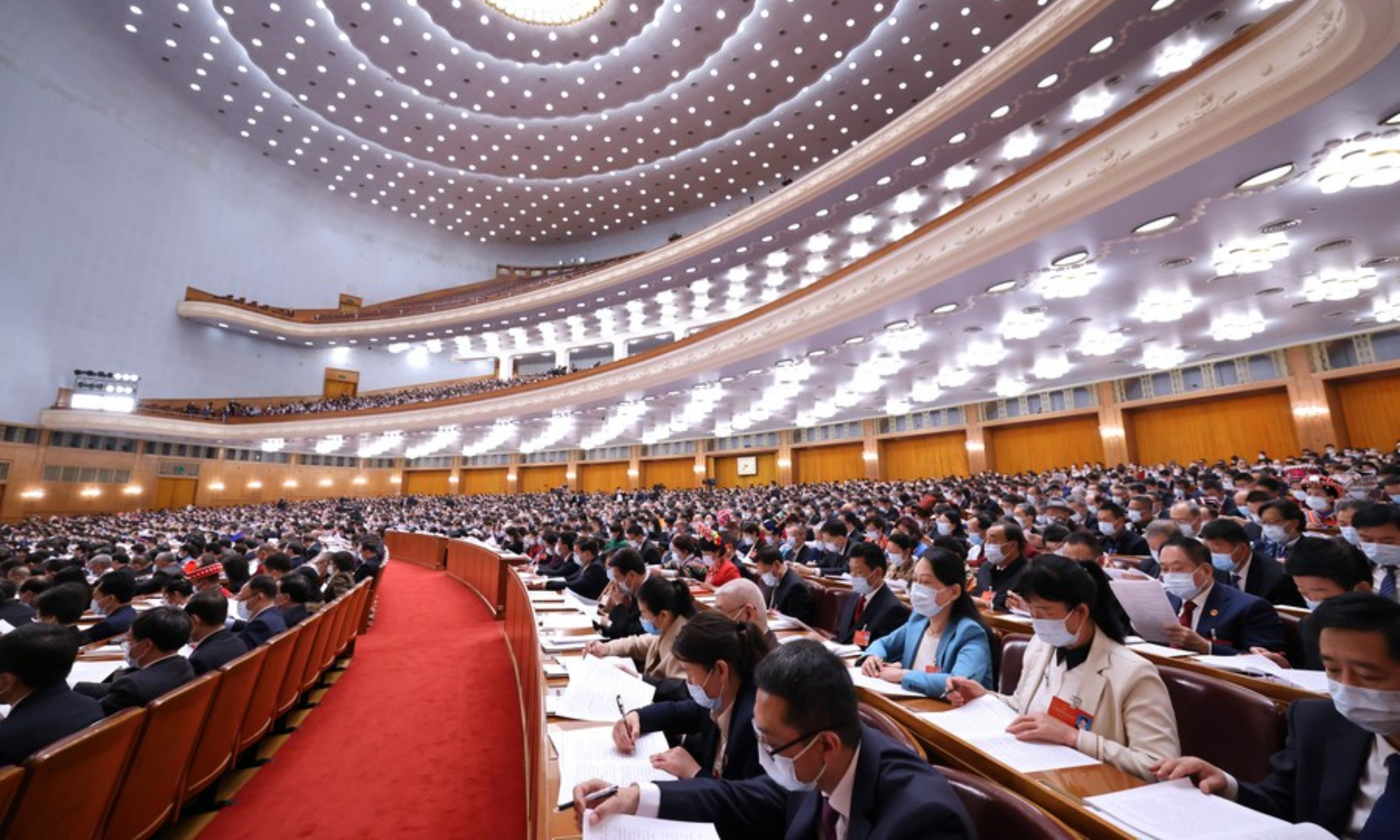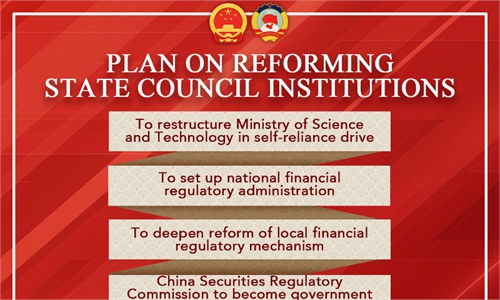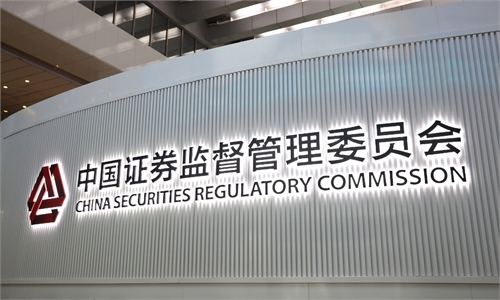China’s financial regulatory shake-up eyes stability, defusing risks
Reforms aimed at preventing financial risks amid increasing global fluctuations, experts say

Deputies to the 13th National People's Congress (NPC) attend the second plenary meeting of the fifth session of the 13th NPC at the Great Hall of the People in Beijing, capital of China, March 8, 2022. Photo:Xinhua
China has moved to overhaul its financial regulatory regime with a slew of institutional reforms launched on Tuesday, in what experts said was a sweeping push to improve supervision efficiency and prevent financial risks and loopholes against the backdrop of global financial fluctuations and China's rapidly evolving financial sector.
They also stressed that the reforms are appropriate regulatory measures launched according to China's actual economic situation, in response to some overseas media's interpretation that China is launching the reforms to tighten government control on financial markets.
The changes, part of a series of ministerial reforms to the State Council and revealed on Tuesday at the National People's Congress, include widely discussed reforms such as setting up a new financial regulatory body and standardizing management of staff in financial departments.
Directly under the State Council, China's cabinet, the new administration will replace the China Banking and Insurance Regulatory Commission (CBIRC) and be in charge of supervising the financial industry except for the securities sector.
Certain functions of China's central bank and the securities watchdog China Securities Regulatory Commission (CSRC) will also be transferred to the new administration, according to the Xinhua News Agency.
As part of the reforms, China will elevate the securities watchdog to become a government agency directly under the State Council, as well as establish a local financial supervision system led by agencies of the central financial management departments.
Preventing risks
In analyzing the intention of such reforms, several financial experts agreed that the reforms have highlighted the goal of preventing and resolving major financial risks.
Tian Xuan, deputy to the 14th National People's Congress (NPC) and associate dean of the PBC School of Finance at Tsinghua University, said the reform answers to the requirement of building a unified and open market system with orderly competition and accelerating the construction of a unified national market.
"By strengthening the coordination of financial integration, preventing regulatory vacuum caused by the fragmentation of regulatory authorities, and eliminating regulatory arbitrage, China will push supply-side structural reforms with the help of finance, as well as make finance serve the real economy in a more high-quality way," Tian told the Global Times.
In April 2022, China unveiled guidelines for accelerating the building of a unified national market, envisioning breaking local protection and market fragmentation and unblocking key sticking points that weigh on economic circulation, as part of a wide-ranging push for an effectively regulated, fairly competitive and fully open market across the country.
In building a unified national market, Chinese top leadership has previously urged efforts to speed up the transformation of government functions, improve government oversight efficiency, promote better alignment between an efficient market and a capable government, and protect the legitimate rights and interests of companies and people's lives and property.
According to Tian, China's previous financial regulatory regime exposed a number of flaws in the process of China's financial development, such as lack of foresight, lack of effective policy guidance for financial problems, and blurred rules.
In recent years, China has seen financial risks being exploded in areas like peer-to-peer lending, digital currencies, housing bubbles and so forth. A large proportion of those risks are related to the rise of online finance without timely and appropriate management.
Meanwhile, the needs for guarding against such risks are becoming increasingly protruding as a result of intensifying fluctuations on global markets.
"As uncertainties of global situation are increasing, financial risks are also becoming complex and severe, with new and old problems intertwined," Tian said.
Apart from preventing financial risks, the reforms will also make financial regulators' division of responsibilities clearer and more reasonable, as the central bank will be in charge of monetary policies, while the new regulatory body will focus on investor protection and market supervision, Liang Haiming, dean of the Hainan University Belt and Road Research Institute, told the Global Times.
Some experts also pointed out the financial reforms will contribute to safeguarding global financial security.
Chen Jia, a veteran financial observer, told the Global Times that as the US Federal Reserve is likely to ramp up interest rate hikes in the coming months, it will lead to even steeper bond yield inversion in cross-border markets.
"China's efforts to further optimize bond market management will exert positive impact in bolstering market expectations and stabilize overseas investment," he told the Global Times.
Under the new reforms, China Securities Regulatory Commission will take oversight of corporate bond issuance, a previous obligation of the National Development and Reform Commission.
Opening up with Chinese characteristics
Setting up of the enlarged national regulatory body is an optimization of the current financial regulatory framework and reflects Chinese characteristics rather than tightening grip on the financial sector as hyped by some foreign media, who claim that the new agency will centralize key policy decision-making, experts said.
The regulatory reform is appropriate and adapts to the route of China's financial reform, Dong Shaopeng, a senior research fellow at the Chongyang Institute for Financial Studies at Renmin University of China, told the Global Times on Wednesday, noting that the move showed no intention to tighten grip on the sector.
"It varies from country to country in terms of coordination of financial regulation and the situation is different between developed and developing countries," Dong said.
Based on the experience of major risks in Chinese and foreign capital markets, the reform provides a better regulatory mechanism to manage risks and deal with illegal behaviors across sectors, markets and business types, Dong added.
In addition, China's financial regulators are not only responsible for defining the country's macro policy and stabilizing the financial market, but also have the task of promoting high-quality development and reform and opening-up, areas rarely touched upon in the European and American financial regulatory frameworks, Chen said.
"Therefore, China must constantly optimize the financial regulatory framework with Chinese characteristics according to its own development experience. The reform of financial regulatory institutions this time reflects this direction and it is an inevitable path of Chinese modernization," Chen said.
Experts also pointed out that China has been persistent with efforts to open up the financial sector by launching market-oriented reforms, ranging from implementing the registration-based IPO system to facilitating overseas capital's better access.
Foreign ownership caps were scrapped for securities, fund management, futures and life insurance firms, allowing multinationals to have a larger and stronger presence in China. Cross-border stock and bond connect schemes were also launched to offer overseas investors easier access to the country's rapidly growing markets.
With wider opening, foreign direct investment (FDI) in the Chinese mainland, in actual use, expanded 6.3 percent year-on-year to 1.23 trillion yuan in 2022, according to the Ministry of Commerce.
In 2021, the capital and assets of foreign banks in China both increased by more than 50 percent compared with ten years ago, and for foreign insurance companies, the figures surged by 1.3 times and 6 times, respectively.






